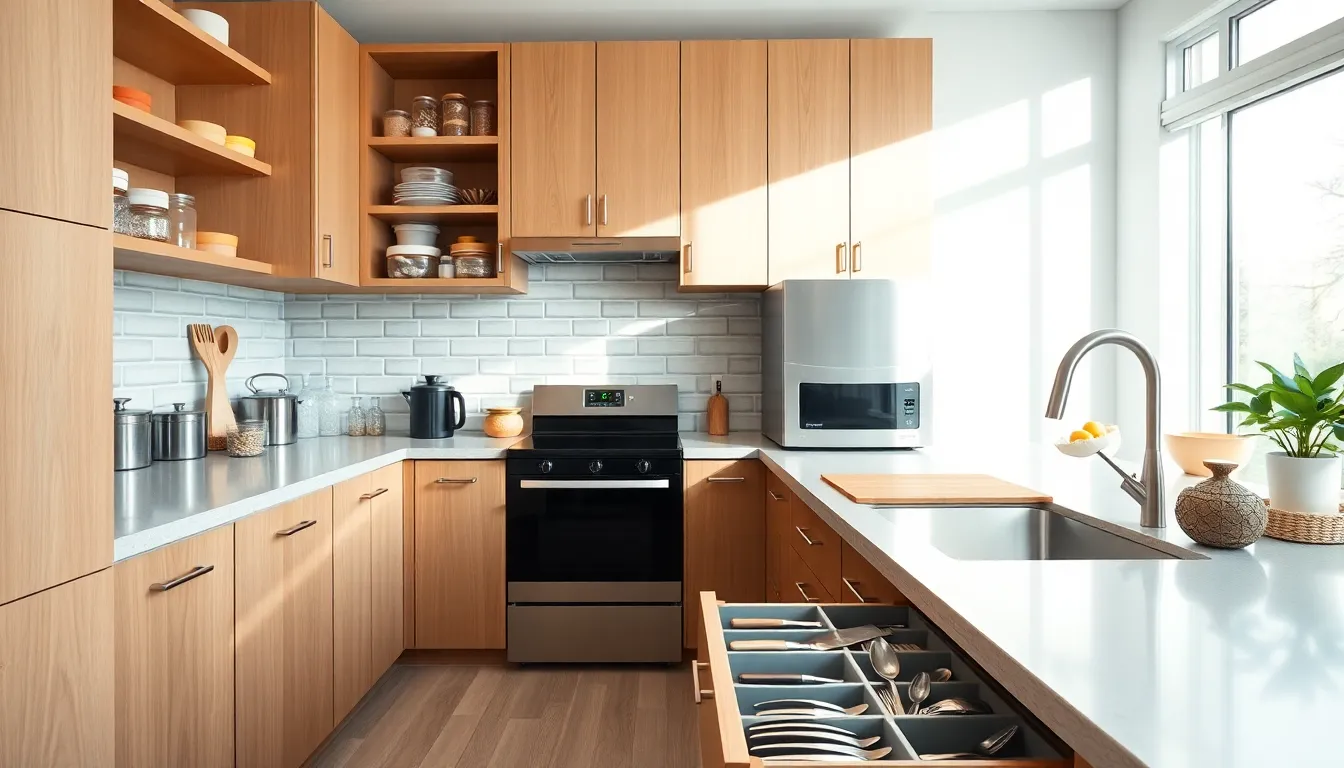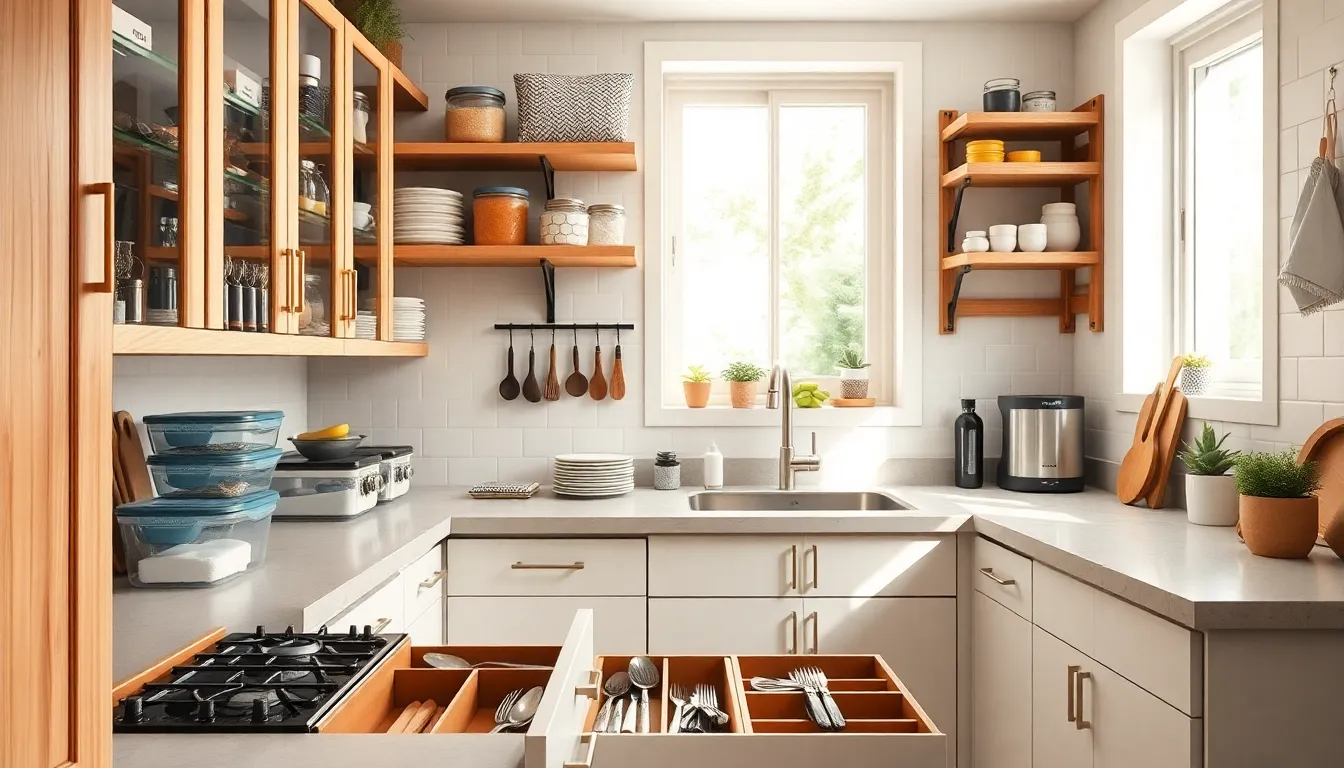In the bustling world of home cooking, efficiency is the secret ingredient that can turn a chaotic kitchen into a well-oiled machine. Who hasn’t found themselves frantically searching for that elusive spatula while a pot of water threatens to boil over? Kitchen efficiency tips are here to save the day, transforming culinary chaos into a smooth and enjoyable experience.
Table of Contents
ToggleUnderstanding Kitchen Efficiency
Efficiency in the kitchen directly impacts cooking flow and overall satisfaction. It involves organizing tools, ingredients, and workflows to minimize wasted time and effort. Common challenges arise when searching for utensils or measuring cups, leading to disorganization during meal prep.
Organizing kitchen layouts enhances accessibility. Grouping similar items together, such as pots with pans and cutting tools with prep surfaces, speeds up cooking processes. Creating a designated space for frequently used items keeps them within reach.
Implementing smart storage solutions also contributes to efficiency. Utilizing drawer dividers improves organization, preventing clutter. Adjustable shelves maximize vertical space, allowing for better management of kitchen inventory.
Streamlining meal prep simplifies cooking. Preparing ingredients in advance can reduce cooking time by up to 30%. Pre-chopping vegetables and marinating proteins ahead of time encourages efficient meal assembly.
Using timers strengthens focus during cooking sessions. Setting timers for various tasks helps track progress, ensuring optimal cooking results. Managing time effectively reduces the likelihood of burning or overcooking dishes.
Lastly, incorporating technology can enhance kitchen efficiency. Smart devices, such as programmable ovens and Bluetooth kitchen scales, offer precise control over cooking temperatures and measurements. These tools not only save time but also elevate the quality of meals.
Prioritizing organization, smart storage, and technology transforms any kitchen into a streamlined environment that supports efficient cooking. Implementing these strategies leads to smoother meal preparation and fosters a more enjoyable cooking environment.
Importance of Kitchen Efficiency Tips


Kitchen efficiency plays a critical role in enhancing the cooking experience. Organizing tools and ingredients minimizes chaos, allowing for a smoother workflow.
Time Management
Effective time management significantly impacts kitchen efficiency. Planning meals in advance coordinates ingredient preparation and cooking steps. Using timers helps track cooking tasks and prevents overcooking. Organizing cooking schedules ensures that all necessary items are ready before getting started, reducing stress. Prioritizing tasks allows chefs to complete meals swiftly, turning cooking into an enjoyable activity rather than a rushed chore. Implementing these strategies boosts exhilaration while cooking, resulting in a satisfying culinary experience.
Space Utilization
Maximizing space utilization transforms kitchens into functional areas. Organizing cabinets with clear containers enhances visibility, making it easy to locate items quickly. Using drawer dividers helps categorize utensils and tools, saving time during meal prep. Vertical storage solutions, such as shelves or pegboards, capitalize on underused areas, increasing accessible space. Prioritizing a clutter-free countertop enables smooth chopping and assembly processes. Efficiently utilizing space encourages a more organized environment that fosters creativity and enhances the overall cooking process.
Essential Kitchen Efficiency Tips
Efficient kitchens rely on organization and meal prep strategies. Implementing effective methods enhances cooking experiences while reducing stress.
Organization Techniques
Organize kitchen tools into accessible zones. Designate specific areas for utensils, pots, and appliances. Use clear containers for visibility of ingredients and label everything for quick access. Drawer dividers improve order by keeping items neatly separated. Optimize cabinet space by installing adjustable shelves that accommodate various items. Keep frequently used tools within reach, ideally on countertop spaces or magnetic strips. A clutter-free environment encourages smoother cooking processes.
Meal Prep Strategies
Prepare ingredients ahead of time to streamline cooking. Chop vegetables and marinate proteins in advance. Use clear containers to store prepped items in the refrigerator. Organizing meal plans simplifies grocery shopping and ensures all necessary ingredients are on hand. Label dated containers for tracking freshness and planning dinners efficiently. Consider batch cooking to save time during busy weekdays. By implementing these strategies, home cooks maximize their time and create more enjoyable culinary experiences.
Tools and Gadgets for Efficiency
Efficient kitchens utilize the right tools and gadgets. Knives of various types enhance cutting tasks, enabling precision and speed. A quality chef’s knife ensures consistent chopping, while specialized knives tackle tasks like slicing bread or filleting fish.
Mixing bowls with lids streamline meal prep, containing ingredients neatly for easy transport and storage. Silicone spatulas work wonders for scraping bowls clean, reducing waste during ingredient transfer.
Additionally, measuring cups and spoons provide accuracy in cooking. Ensuring precise measurements can significantly impact flavor and texture. Digital kitchen scales facilitate this measurement, allowing for quick adjustments in recipes.
Food processors simplify chopping, blending, and puréeing tasks, cutting down prep time. High-performance versions can handle tough jobs like grinding nuts or making dough. Immersion blenders also offer a versatile solution for soups and smoothies, blending directly in pots or jars without extra cleanup.
Slow cookers and pressure cookers cater to various cooking styles, saving time and enhancing flavor profiles. Slow cookers allow for set-and-forget meal preparation, while pressure cookers significantly shorten cooking durations.
Utensil trays organize tools, promoting a clutter-free workspace. Spice racks keep seasonings within reach, enhancing flavoring efficiency during cooking. Oven thermometers ensure accurate baking temperatures, preventing undercooked or burnt dishes.
Smart gadgets, such as programmable timers and smart kitchen scales, help manage tasks effectively. Arduino-based kitchen devices can automate certain processes, improving workflow efficiency through technology integration.
Reducing Waste in the Kitchen
Reducing waste in the kitchen contributes significantly to overall efficiency. Start by planning meals strategically to utilize ingredients fully, preventing spoilage. Implementing a first-in, first-out system for perishable items helps maintain freshness and minimizes waste.
Utilizing scraps is another effective method. Vegetable peels, stems, and herb stems can serve as excellent bases for broths, enhancing flavors without additional cost. Composting unused scraps also creates an eco-friendly option for kitchen waste.
Opt for proper storage techniques. Airtight containers preserve food freshness, extending shelf life and preventing mold growth. Labeling containers with dates ensures that older items get used first, avoiding neglect.
Repurposing leftovers can further reduce waste. Transforming unused food into new dishes encourages creativity while minimizing food disposal. For instance, day-old bread becomes croutons, and leftover roasted vegetables can join a stir-fry.
Adjusting portion sizes also plays a crucial role. Serving smaller portions prevents leftovers and encourages mindful eating habits. If guests require more food, they can always return for seconds, which helps to limit waste considerably.
Checking pantry contents before grocery shopping reduces impulse buying. Creating a shopping list based on existing ingredients ensures enough supplies while preventing unnecessary purchases. This habit cuts down on expired items and enhances cost efficiency.
Integrating efficient cooking methods can lessen energy use too. Batch cooking encourages preparing larger quantities at once, saving time and resources. Utilizing appliances like slow cookers makes best use of energy, while pressure cookers reduce food waste through speed.
Embracing kitchen efficiency transforms cooking from a chore into a delightful experience. By organizing tools and ingredients and implementing smart storage solutions, home cooks can streamline their workflows and enhance their culinary creativity. Effective time management and strategic meal planning not only reduce stress but also minimize waste, making every cooking session more productive.
Utilizing the right tools and gadgets is essential for maximizing efficiency. With the right setup and mindset, anyone can create a kitchen environment that fosters enjoyment and satisfaction in every meal prepared. A well-organized kitchen encourages exploration and experimentation, turning every recipe into an opportunity for delicious results.


